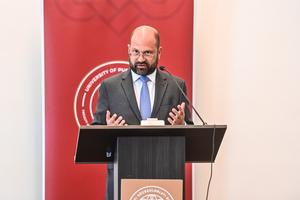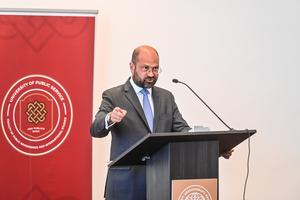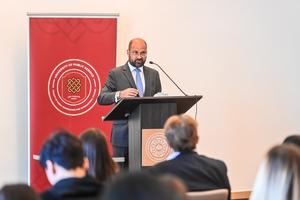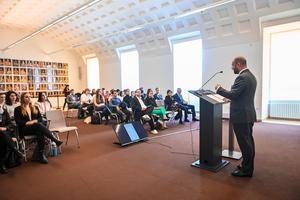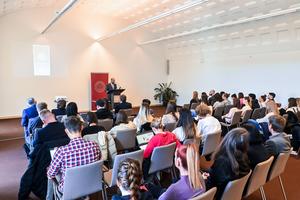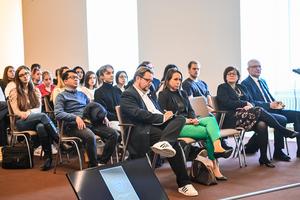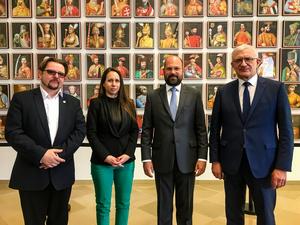Professor Damjan Krnjević Mišković, Director of the Institute for Development and Diplomacy, ADA University, Baku, Azerbaijan, gave a public lecture and a workshop at the Faculty of Public Governance and International Studies, in the framework of the Ludovika Scholars Program. The two events focused on the South Caucasus region, its changing geopolitical importance and the energy diversification that can be achieved from there.
In his presentation, Damjan Krnjević Mišković showed that the balance of power in the Silk Road region is not only changing, but is also being transformed. This is based on three recent events: the second Karabakh war, the withdrawal of the United States and its allies from Afghanistan, and the Russian-Ukrainian war. The consequences of these events have been an acceleration of regionally driven economic interconnection as an internal transformative factor and a decline in external power agenda-setting in the region as an external factor. Moreover, the relative power of some outsiders is declining while that of others is increasing. Hence, the 'great chessboard' metaphor created by Zbigniew Brzezinski, which has long framed geopolitical thinking about the Silk Road region, is outdated and even flawed. In his lecture, the professor proposed the new metaphor of the card table to replace it. The clear conceptual advantage of thinking of the region as a card table is that more than two players can be seated, which is not possible in the case of chess. New players can join, old players can drop out, and anyone can put their cards in at any time. Not only are Washington, Moscow or Beijing dealt a hand, but Nur-Sultan, Tashkent, Baku, or even Delhi, Tehran, Ankara can also appear in the tournament. This means that the region, which the professor has consciously and consistently identified as the Silk Road region instead of the Eurasia concept, is no longer just an object of great power relations; it is becoming an autonomous, emancipated subject of the international order. In this context, he analysed the initiatives and institutions emerging in the South Caucasus and beyond, which together could represent the emergence of a stable and enduring order. At the forefront of this process are the middle powers (keystone states) of the region: Azerbaijan, Uzbekistan and Kazakhstan. None of these states is indispensable, but together they provide the balance, while setting the tone, pace and scope of the overall cooperation agenda. External powers exert some influence, but developments in the Silk Road region are unlikely to continue to be decisively driven by the often conflicting agendas, preferences, objectives and priorities of the major powers.
Professor Damjan Krnjević Mišković discussed some aspects of the region's upgrading in a workshop with experts, with a special focus on energy diversification issues. In addition to the professors and experts of Ludovika, the meeting was attended by representatives of the Ministry of Foreign Affairs and Trade, Corvinus University, the Migration Research Institute, among others. The analysis focused on whether the events of the Russian-Ukrainian war have actually tipped the geopolitical balance in favour of the EU's overall strategic engagement with Azerbaijan. Elements of this were considered, in particular the issues of connectivity, which is essential for energy diversification, and the issue of land logistics corridors between the EU and Asia. In his concluding remarks, Professor Damjan Krnjević Mišković stressed that Azerbaijan is now an indispensable player if the EU is to realise its own strategic ambitions.
During the events, Ambassador Iván Gyurcsík, Director of the Ludovika Scholars Program, presented the role and importance of the guest lecturer program in the internationalization of the university. Professor Krnjević was also received by Dr. Gergely Deli, rector of the University of Public Service and by Dr. Réka Varga, Dean of the Faculty of Public Governance and International Studies. The discussions included not only potential future cooperation but also a very intense exchange in diplomatic affairs.
About Professor Damjan Krnjević Mišković: he is Director for Policy Research, Analysis and Publications at the Institute for Development and Diplomacy of the ADA University, Baku. He is the co-editor of the journal Baku Dialogues and member of the Board of Editors at Orbis: A Journal of World Affairs from the Foreign Policy Research Institute, Philadelphia. In previous years he was the Executive Director of the Center for International Relations and Sustainable Development in Belgrade. From 2012 to 2014 he was Senior Special Adviser to the President of the UN General Assembly in New York. From 2004 to 2006 he was Special Adviser to the President of Serbia and served as the Director of Policy Planning and Analysis. Later on from 2007 to 2012 he worked in the Ministry of Foreign Affairs of the Republic of Serbia as Senior Adviser and also Chairperson of the Admissions Committee of the State Diplomatic Academy.
Text: Ludovika-UPS, FPGIS, International Division
Photo: Boglárka Soós, Dénes Szilágyi
